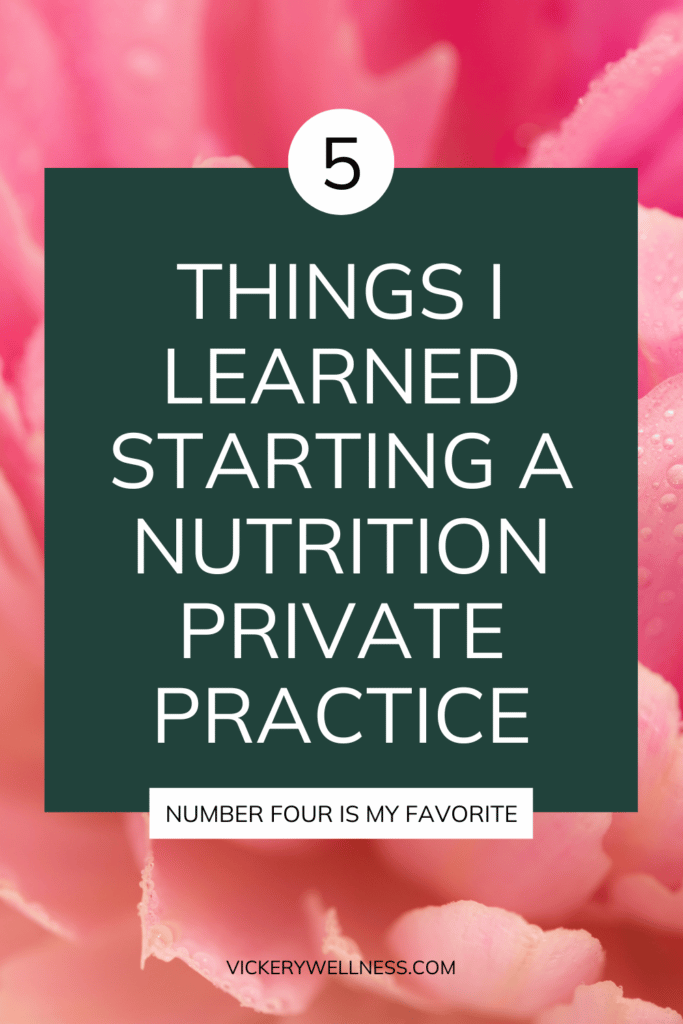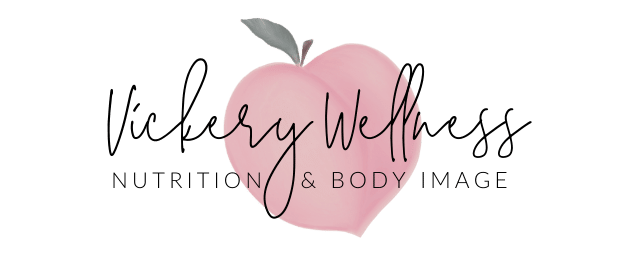When I got to the point in my life that I thought about starting my nutrition private practice, it was a bit of ‘duh’ moment for me. See, I come from a large family of entrepreneurs and have always worked for myself or someone else since I was 14 years old.
So, while a lot of things about business came ‘naturally’ to me, I still had a lot to learn! And while starting a nutrition private practice can be exciting, it can also be a challenging journey. It requires careful planning, patience, and perseverance. However, after almost 3 years of owning a nutrition private practice, I can say that it’s been a rewarding and fulfilling experience!
In my practice, I specialize in helping adults and college students heal their relationship with food and their bodies, and heal from eating disorders. Through trial and error, I’ve learned a lot about what works and what doesn’t work when it comes to running a successful nutrition private practice. I’ve discovered some valuable insights that I would like to share with you.
And before I get into the top 5 things I learned, I have to point out something else: And that is before you do ANYTHING, you NEED to have a somewhat clear idea of your target audience and the services you plan to offer. This will help you establish your brand and create a clear message to attract clients (and save your sanity!).

Now, let’s dive into the 5 Things I learned starting a nutrition private practice!
Table of Contents
Imperfection is Okay
When starting a new business, it’s natural to want everything to be perfect. You want to have the perfect logo, website, marketing strategy, and client experience. However, this pursuit of perfection can be a major roadblock to getting started. You can spend months or even years trying to create the perfect business plan or website, but at the end of the day, you still haven’t started seeing clients.
In my experience, it’s better to embrace imperfection and JUST START.
Of course, you want to put your best foot forward, but you don’t need to have everything perfect from the start. You’ll learn as you go and make adjustments along the way. Instead of striving for perfection, focus on progress. Take small steps each day to build your business and grow your client base.
You Need a System
As a nutrition professional, you’ll be working with many clients, and it will be challenging to keep track of all their information and appointments. To manage your workload efficiently and provide excellent service to your clients, you NEED to have a system in place.
First and foremost, you need a scheduling system that allows clients to book appointments with you easily. There are many scheduling tools available, such as Acuity Scheduling, Calendly, and TidyCal (this is an affiliate link for a lifetime deal of only $29!). These tools allow clients to see your availability and book appointments with you online.
You also need a system for collecting payments from clients. You can use platforms like Stripe or PayPal to collect payments for services. You can also create invoices using software like QuickBooks or FreshBooks (I personally use Zipbooks).
Finally, you need a system for keeping client records. It’s important to keep track of client information, including medical history, food preferences, and progress. You can use electronic health record (EHR) software to manage client records. Examples include Practice Better, Healthie, and SimplePractice.
Now, you don’t necessarily need all of those, so if I had to pick one, I would 100% choose Practice Better. You can do all of your scheduling, invoices, payments, notes, chat with clients, build a course, and more!
Whatever system you choose, you have to make sure it is HIPAA compliant. That means you have to sign a BAA agreement and you cannot skip this part!
Check out my post on my top 10 software recommendations for private practice over at my design studio website.
Local Networking is Key
Networking is an important part of growing any business, and nutrition private practice is no exception. In fact, in my experience, local networking is more important than social media.
I said what I said ????????.
Networking allows you to meet potential clients, build relationships with other professionals, and learn more about your community and its needs.
To get started with local networking, you can look for groups and organizations in your area that are relevant to your business. Examples include local chapters of professional organizations like the Academy of Nutrition and Dietetics (AND), wellness groups, and health-focused nonprofits. You can also attend local events and conferences to meet new people and learn about new trends in your industry.
Another way to build your network is to offer free workshops or talks in your community. You can partner with local businesses or organizations to host these events and attract potential clients. This is my favorite way to network!
A Clear Brand is Crucial
Your brand is the way that people perceive your business. It’s the image that you present to the world, and it’s crucial for attracting new clients.
Your brand should convey your values, mission, and services in a clear and concise way.
When developing your brand, it’s important to consider your target audience.
Who are your ideal clients, and what are their needs and preferences?
What sets you apart from other nutrition professionals in your area?
Answering these questions will help you create a brand that resonates with your audience and sets you apart from the competition.
Your website is also an essential part of your brand.
It should be user-friendly and professional (note: I didn’t say boring), and it should provide clear information about your services and how to book appointments. It’s also important to have a blog or other content marketing strategy to showcase your expertise and provide value to potential clients.
I offer website and branding services to fellow weight-inclusive dietitians and I’d be happy to help you!

Virtual/Telehealth is the Future
In the wake of Covid, virtual and telehealth services are now more popular than ever before.
Even before the pandemic, there was a growing trend toward virtual consultations and telehealth services. However, the pandemic accelerated this trend, and now many people prefer virtual consultations as it offers convenience, flexibility, and safety.
In my experience, offering virtual consultations has been essential to the success of my nutrition private practice. It allows me to work with clients from all over the country, not just those in my local area.
It also allows clients to have appointments from the comfort of their own homes, which can be more comfortable and convenient for them.
To offer virtual consultations, you’ll need a reliable video conferencing platform such as Zoom, Skype, or Google Meet (HIPAA Compliant versions!).
It’s also important to establish clear policies and procedures for virtual consultations, such as how to schedule appointments, how to access the video conferencing platform, and what to expect during the appointment. Clear communication and organization are essential for a successful virtual consultation.
There you have it!
In conclusion, owning a nutrition private practice can be challenging, but it’s also incredibly rewarding. After my first year of owning one that specializes in helping adults and college students heal their relationship with food and their bodies and heal from eating disorders, I learned that imperfection is okay, having a system is crucial, local networking is key, having a clear brand is crucial, and virtual/telehealth is the future. By embracing these principles, you can build a successful practice that helps people heal and live healthier lives.








0 Comments